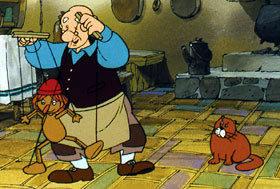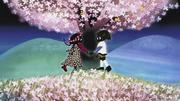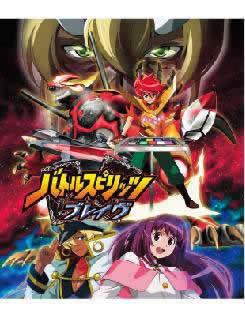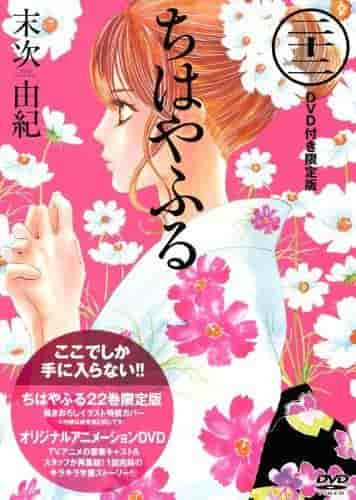The Adventures of Piccolino: A deep look into the fascinating story and characters

The Adventures of Piccolino - Looking back at classic anime"The Adventures of Piccolino", which aired from 1976 to 1977, is a TV anime series based on Carlo Collodi's fairy tale "The Adventures of Pinocchio". Although based on the original story, this work captivated viewers with its original characters and developments. Here, we will take a closer look at its appeal, production background, cast and staff, and recommended points for viewers. storyThe kind-hearted old man Zebra, who lives with his cat Julietta and woodpecker Rocco, carved a wooden puppet out of his desire to have a child. However, to his surprise, the puppet started to move on its own. Zebra named the puppet Piccolino and raised it with care, but Piccolino was a mischievous and troublesome boy. Dino the ragged fox and Witch the wild cat tricked him and sold him to a playhouse. Piccolino began a journey with Gina the duck to return to Zebra's home. Commentary"The Adventures of Piccolino" is based on the fairy tale "The Adventures of Pinocchio", written by 19th century Italian author Carlo Collodi when he was around 50 years old. In terms of being animated, it was preceded by "Oak Tree Mock" produced by Tatsunoko Productions in 1972, but this Piccolino succeeded in creating a unique character that was unique to this work by including many animal characters that were not in the original work. Furthermore, it is worth noting that it was exported to Italy, where merchandising using Japanese products was also carried out there. This work not only gives children hope and dreams, but also contains moral lessons. Every time Piccolino tells a lie, his nose grows, teaching the audience the importance of honesty. Also, the way Piccolino grows throughout his journey teaches children the value of hard work and friendship. castThe voice actors were Masako Nozawa as Piccolino, Junji Chiba as Zebeto, Kazuko Sugiyama as Gina, Kenta Kimotsuki as Rocco, Miyoko Aso as Julietta, Osamu Hase as Boro Kitsune, Ichiro Nagai as Dora Neko, Kazuhiko Kishino as Manchero, Haru Endo as the Grandmother, Minoru Midorikawa as the Boss, and Miyoko Aso as the Narrator. These voice actors express the individuality of the characters richly, enhancing the charm of the work. Main StaffBased on Carlo Collodi's "The Adventures of Pinocchio," the film is produced by Koichi Motohashi, production manager Mitsuru Takakuwa, planning director Shoji Sato, music by Yasushi Nakamura, directors Hiroshi Saito and Masashi Endo, producers Ihiro Oba and Tadami Watanabe, screenplays by Masao Maruyama, Iwao Yamazaki, Yutaka Kaneko, Shuji Yamazaki, and Yumeji Asagi, and character designs by Takao Ogawa and Shun Nobe. The animation directors are Takao Ogawa, Michiyo Sakurai, Koichi Murata, and Toshio Nobe, the art director is Masahiro Ioka, the art assistant is Goichi Kudo, the director of photography is Keiichi Kuroki, the sound director is Yasuo Urakami, the color design is Kaoru Uno, the animation directors are Masashi Kato, Kazuko Hirose, Issei Takematsu, Setsu Yoshihashi, Yasuo Mori, OH Production, Joji Manabe, Kenichi Okamoto, Yutaka Oka, and Nishi The production team included Sumie Tono and Yoko Tomizawa, with finishing touches by Studio Killy and Studio Furumi, background design by Atelier Roku 69's Goichi Kudo, Seihei Kawamoto, Taizaburo Abe, and Nobuo Numai, photography by Trans Arts, Tetsuro Kumase, and Yukio Okazaki, editing by Hajime Okayasu, mixer (sound editing) by Tsugio Nakatogawa, effects by Mitsuru Kashiwabara, recording studio by Shinsaka Studio, developing lab by Tokyo Developing Lab, titles by Akira Michikawa, storyboards by Seiji Okuda, Hiroshi Saito, Fumio Ikeno, Masaharu Endo, Masami Hatano, Kunihiko Okazaki, Shigeo Koshi, Kiyomi Oka, and Hiroshi Fuji, assistant directors were Shigeo Koshi and Tsunehisa Osonoi, production desk was Shigeo Endo, and production was by Nippon Animation, Asahi Broadcasting, and Apollo Films. The opening theme "I'm Piccolino" was written by Kazuko Katagiri, composed by Yasushi Nakamura, arranged by Kensuke Kyo, and sung by Kumiko Osugi and Young Fresh, while the ending theme "Shade of the Olive" was also written by Kazuko Katagiri, composed by Yasushi Nakamura, arranged by Kensuke Kyo, and sung by Kumiko Osugi and Young Fresh. These songs, with their familiar melodies and lyrics, further deepen the worldview of the work. Main CharactersPiccolino is a wooden puppet that can move on its own with its own will. He loves to play puppets, and is under a spell that makes his nose grow whenever he tells a lie. Gebeto is the kind-hearted grandfather who created Piccolino, and Gina is a sensible duck who travels with Piccolino and acts as a scolding agent. Rocco is a woodpecker who lives with Geppetto, Julietta is a cat who lives with Geppetto, and Raglan Fox and Doraemon are villains who always act together and sell Piccolino to a playhouse. The story woven by these characters provides viewers with both emotion and laughter. subtitleThe subtitles for all 52 episodes are as follows:
Theme songs and musicThe opening theme "I'm Piccolino" was written by Kazuko Katagiri, composed by Yasushi Nakamura, arranged by Kensuke Kyo, and sung by Kumiko Osugi and Young Fresh, while the ending theme "Shade of the Olive" was also written by Kazuko Katagiri, composed by Yasushi Nakamura, arranged by Kensuke Kyo, and sung by Kumiko Osugi and Young Fresh. These songs, with their familiar melodies and lyrics, further deepen the worldview of the work. Recommended points"The Adventures of Piccolino" is a work that can be enjoyed by both children and adults. In particular, the following points make it worthy of recommendation:
"The Adventures of Piccolino" is a work that combines nostalgia and freshness. Please watch it and experience its charm. |
<<: Song of the Boy Pirates: A thorough evaluation of everyone's songs!
>>: The appeal and reviews of Chodenji Robo Combattler V: Is it recommended for modern anime fans?
Recommend
The online drama "My Chinese Chip" has been postponed. Making chips while falling in love?
The Chinese chip technology web drama "My Ch...
Comedy adventure animation "Peter Rabbit 2: The Runaway Plan" released a new trailer with Chinese subtitles
The comedy-adventure animated film "Peter Ra...
"Changjin Lake" new behind-the-scenes special, stills & character profiles, face covered with scars in the snow
Today (September 14), the movie "Changjin La...
Transformers 7 extended its screening to August 8, with domestic box office exceeding 600 million
The official Transformers blog announced that the...
"Kage": A unique work depicting the world of shadows, reviews and impressions
The appeal and evaluation of "Kagerou":...
The latest character settings for the new version of the 2018 classic "Fruits Basket" animation
The new animated version of the classic manga &qu...
Pixar animation "Lightyears" media reputation lifted Rotten Tomatoes freshness score 84%
The media reputation ban on Pixar's new anima...
The appeal and evaluation of "Banipal Wit": In-depth review
Vanipal Witt - A fantasy world born from picture ...
The second season of "Iruma-kun is possessed by the devil" has been confirmed to be broadcast in spring 2021
Today (March 7), Nishi Osamu, the author of the m...
"Tenchi Muyo GXP" new OVA confirmed to be produced for the 30th anniversary
The classic anime series "Tenchi Muyuu"...
The appeal and evaluation of Saint Tail: New possibilities for girl heroes
Saint Tail: The Story of the Magnificent Thief an...
Detailed review and rating of Koikeya SDGs Theater Sasu and Tena Season 2
Koikeya SDGs Theater Sass and Tena Season 2 Revie...
The Brave of Gold Goldran: The Brilliance of the Brave and the Charm of Battle
Golden Brave Goldran - A glorious chapter in the ...
PUI PUI Guinea Pig Car Episode 10: A Hero in Another Sense
Today (March 9), Bandai officially updated the te...
The appeal and reviews of the anime "LOVE": A thorough analysis of the moving story and character depth
The appeal and evaluation of "LOVE": th...




![A thorough evaluation of the appeal and potential of Exciting Zoo [Pilot Version]!](/upload/pic/02563.jpg)




